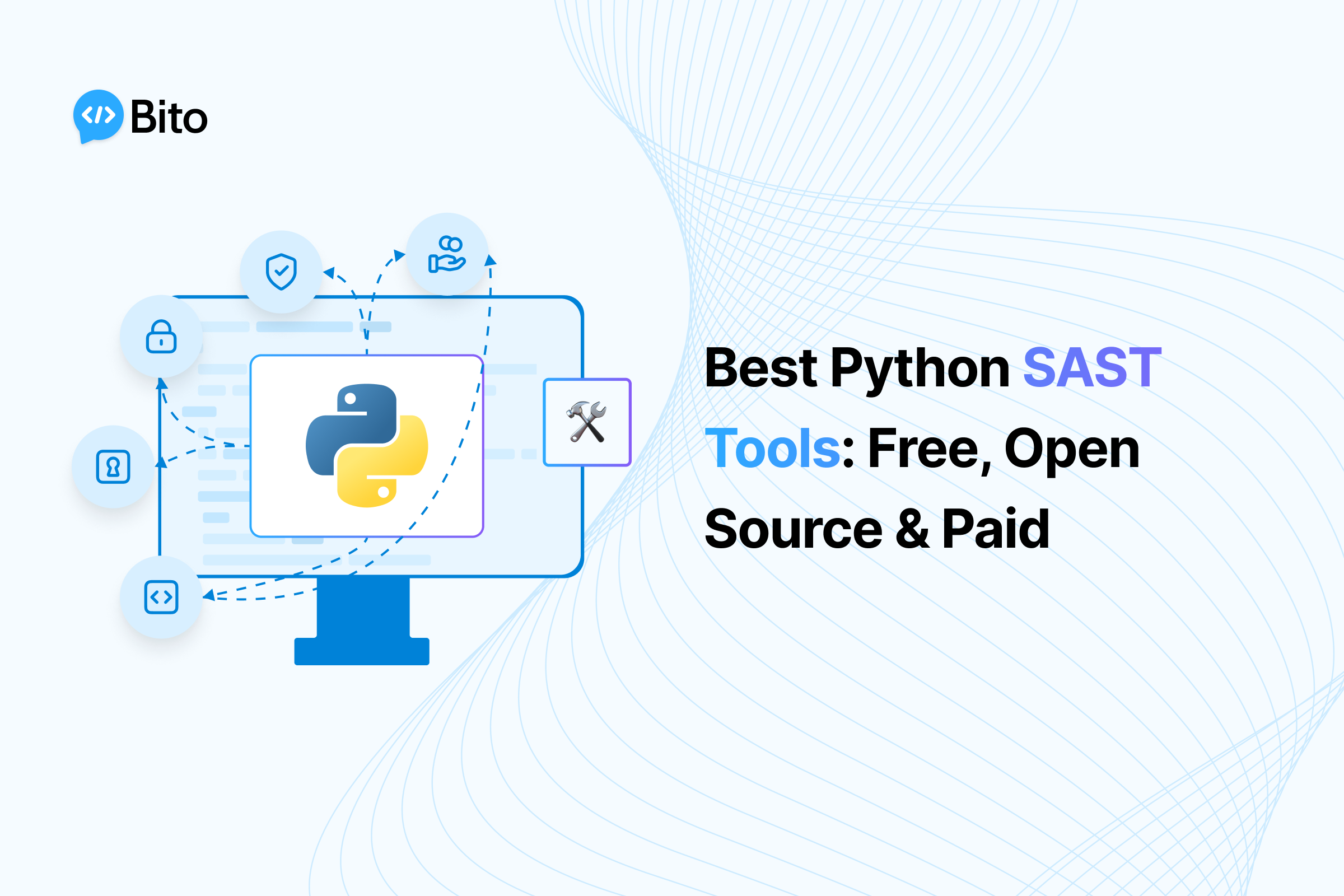Static Application Security Testing (SAST) tools are solutions that scan your application source code or binary and find vulnerabilities. It is known as White-box testing and developers can use it within the IDE or integrate it into CI/CD pipelines.
SAST tools empower developers to Shift Left Security by detecting flaws and weaknesses in code before deployment. This proactive approach helps developers write more secure applications from the start, reducing overall risk and costs.
In this comprehensive guide, we will explore the top open-source and paid SAST tools available for Python developers to analyze their code.
How SAST Tools Work
To understand which SAST tools are most effective, it helps to know how they work under the hood. Here are some of the core code analysis techniques used:
Lexical Analysis
SAST tools start by scanning code and validating syntax to catch basic errors. Lexical analysis ensures code adheres to the proper structure and rules.
Control Flow Analysis
Control flow analysis examines the execution paths in code. It looks at branching statements, loops, and function calls to validate expected sequencing. This catches flaws like infinite loops, missing branches, and dead code.
Data Flow Analysis
One of the most important techniques, data flow analysis tracks the lifecycle of data from untrusted inputs to where it is used. This verifies that dangerous inputs don’t flow unchecked into sensitive functions.
Semantic Analysis
SAST tools use semantic knowledge to understand the meaning and impact of code. This goes beyond syntax to detect logical vulnerabilities like SQL injection based on how input data is used in queries.
Configuration Analysis
For web apps, SAST tools also scan configuration files for security issues like hardcoded credentials or enabling insecure protocols.
Integrating SAST Tools into Workflows
To get the most value, SAST tools should integrate into developer workflows:
IDE Plugins
Plugins for IDEs like Visual Studio Code provide real-time scanning and feedback as code is written, flagging vulnerabilities early.
CI/CD Integration
SAST tools can scan code during CI/CD pipelines on pull requests or commits to block the introduction of flaws.
Issue Tracking
Results can automatically link to tickets in issue trackers like Jira for developers to review and remediate after scans.
Top Open Source Python SAST Tools
Open source SAST tools provide a free option for scanning Python code:
Bandit
Bandit is a Python code security scanner from PyCQA. It finds common vulnerabilities like injection flaws, hard-coded secrets, and security misconfigurations. Bandit integrates into IDEs and supports scanning via CLI, GitHub Actions, and other CI/CD tools.
Bandit is quick to setup and configure, with scanning guided by security profiles. It provides clear results with risk ratings and remediation guidance.
Semgrep
Semgrep is an open source tool from r2c that matches semantic code patterns to detect vulnerabilities and bugs. It supports Python, JavaScript, Java, Go, and other languages.
# semgrep rule
routes.py:
$ROUTE = flask.Blueprint(...)
@$ROUTE.route("/login", methods=["POST"])
def login():
...
if user_input == "admin": # DANGEROUS
...
Semgrep has a large public ruleset maintained by the community. Rules can be written in YAML for customization. It integrates with CI/CD pipelines and IDEs to find issues early.
Top Commercial Python SAST Tools
Leading commercial SAST tools with Python support include:
Checkmarx Static Code Analysis
Checkmarx SAST provides highly accurate scanning for Python and other languages. It has over 70 vulnerability engines covering the OWASP Top 10 and more.
Checkmarx integrates into IDEs like Visual Studio and CI/CD pipelines. It provides detailed reports with remediation guidance.
Veracode Static Analysis
Veracode is a SAST pioneer and leader in the Magic Quadrant. It offers robust scanning for Python and 20+ other languages.
Veracode has deep analysis capabilities to find flaws like injection attacks. It seamlessly integrates scanning into pipelines and issue tracking.
GitHub Advanced Security
GitHub Advanced Security uses CodeQL to scan Python repositories for vulnerabilities. It runs on push and pull requests with results shown in the GitHub UI.
Advanced Security is part of GitHub Enterprise plans starting at $24/month per user. Public repositories get scanning for free.
GitLab SAST
GitLab SAST provides built-in scanning for repositories written in Python, Java, JavaScript, Ruby, C/C++, and more.
It can be run on demand or integrated into the CI/CD pipeline. GitLab provides detailed reports with remediation guidance.
Key SAST Tool Capabilities
When evaluating SAST tools for Python, keep these key criteria in mind:
- Accuracy tools should reliably detect vulnerabilities like XSS, SQLi, command injection
- Workflow integration** – integrate via IDE plugin, CI/CD, ticketing
- Custom rules – write custom rules to catch application-specific issues
- Comprehensive coverage** – scan dependencies like Django, Flask, NumPy
- Reporting – provide clear results with risk ratings and remediation details
- Ease of use – simple to install, configure, and run scans
- Scalability – handle large codebases and scans efficiently
Focus on tools that make scanning seamless without disrupting developer productivity.
Integrating a SAST Tool into Your SDLC
For Shift Left Security, integrate your SAST tool into your software development lifecycle:
- Developers install IDE plugins so they get real-time feedback about vulnerabilities in their code as they write it. This catches issues early before they get committed.
- Configure CI/CD integration to scan code during automated builds. Fail risky builds before they get deployed to production.
- Remediate findings by linking results to tickets so developers can review and fix post-scan. Provide remediation guidance.
- Run scans early and often the earlier in the lifecycle issues are caught, the quicker and cheaper they are to fix.
Conclusion
SAST tools like Bandit, Semgrep, Checkmarx, and Veracode make it easy for Python developers to scan their code for vulnerabilities before deployment. This proactive approach reduces risk and saves time and effort by fixing issues early. Look for a SAST tool that provides accurate results, integrates into your workflows, and is fast and easy to run. Set up scanning early in the development process and fail risky builds to enforce security in your SDLC. SAST is essential for any Python project that values speed, quality, and security.






